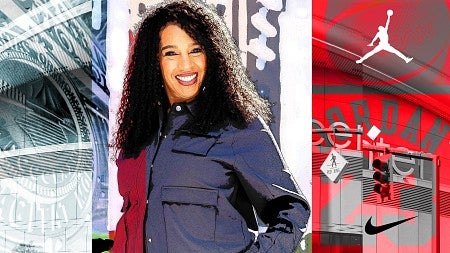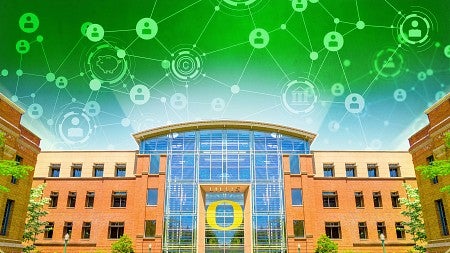
Profile: Ed Whitelaw, Professor Emeritus, Economics
After 52 years of teaching at the UO, Ed Whitelaw shows no signs of slowing down
By Melody Ward Leslie • Photo by Chris Larsen • October 2, 2019
4 min read
Joyful. Unconventional. Principled. Kind. A teacher who opens doors not previously known to exist, with no sign of slowing down after 52 years on the University of Oregon faculty.
That’s how economics professor Ed Whitelaw’s students describe him, whether they graduated in 1979 or 2019. Many say they do not know where they would be today if they hadn’t taken Whitelaw’s urban economics class, which they refer to as EC 432.
He is a national authority on the economics of cities and regions, labor and poverty, the environment and natural resources, and the economic consequences of policy decisions. He delights in making a difference in the real world through EcoNorthwest, which he founded in 1974. Now based in Portland, it is the largest and most respected economic consulting firm in the Pacific Northwest. In 2016, he started FION, a smaller firm in Eugene that occasionally works with EcoNorthwest.
His legions of “cub economists,” an Ed-ism for econ majors, hold high-level positions the world over, but the “Ed-xperience” (a term coined by students) also leaves an indelible mark on nonmajors in entry-level courses.
“Socrates himself could scarcely have prepared me better for law school,” says Joel Willard, BS ’00 (political science), an attorney in California.
"Plain Eddie, not proud"
Raised a bib overalls–clad Quaker, Whitelaw grew up in western Kansas. His mother, determined to save him from a swelled head, would whisper: “Plain Eddie, not proud,” as he rose from his seat to collect academic honors and prizes at school events—which happened often enough that, to this day, his habit of deflecting praise is as noticeable as his lanky frame and wide-eyed enthusiasm.
The Professor
Early on, Whitelaw developed the habit of draping intentionally odd ties over his shoulders like a shawl. They always slip to the floor at some point during class, but he is so intent on leading students through mazes of economic theory that he never notices. Lucy Hackett, BA ’15 (economics), says Whitelaw pushes his students to be useful—to apply what they learn in the real world. “He was my first introduction to theoretical rigor,” says Hackett, now an economist with the National Laboratory for Public Policy in Mexico City. “In my master’s program it was his voice in my head helping me separate necessary from sufficient conditions in my proofs.”
Once, a suit
Whitelaw’s expertise has helped decide matters before the North American Free Trade Act tribunal, as well as state and federal courts. But even for high-stakes cases, his wardrobe stays solidly in the business casual lane—although research assistants have revealed he sometimes wears a Superman belt. However, for the case where he testified on behalf of the United States before a powdered wig–wearing barrister from London and justices from Canada and the US, Whitelaw’s staff insisted that he put on a suit.
The legacy
Last June, a roast celebrating Whitelaw’s half-century of teaching brought dozens of his protégés to campus, where they were first to learn (along with Whitelaw) of an anonymous gift creating the Ed Whitelaw Chair in Urban Economics. Whitelaw reacted with characteristic modesty. “This gift honors teaching,” he said. “In teaching, I finally learned some economics—and more important—saw students learn far more than economics.” His mother would be pleased, if not proud.
Bruce McGough, who worked for EcoNorthwest after earning a mathematics degree in 1993, will never forget the day Ed told him to go back to school. “I thought I was being fired,” McGough says. Instead, Ed picked up the phone. “I’ve got this kid here,” the stunned McGough heard Ed say to economics professor Van Kolpin, “and you’ve got to admit him to the program.”
McGough went on to earn a master’s and PhD in economics at the UO. “This career path wasn’t even on my radar,” he says, “but somehow Ed had the insight to see that it might work out for me.” And how. McGough is the current chair of the UO economics department—or, as he likes to say: “Ed’s boss.”
The second paycheck
In Oregon, journalists have sought out Ed for insight about the state’s economy for more than five decades. In the 1970s, when asked to comment on the fact that urban Oregonians often accept lower-paying or lower-status jobs, Ed coined the term “second paycheck” to explain the economic value of Oregon’s unspoiled natural amenities.
The economics of cookies
Weekly quizzes with answers limited to 24 words—or fewer. Seven a.m. study sessions for struggling students—on Saturdays—with the tradition of estimating the ratio of frosting height to dough height on the sugar cookies Whitelaw brings from a bakery. “It was always a big deal for us nerds when the ratio exceeded 1:1,” says Mark Stevens, an associate professor of community and regional planning at the University of British Columbia.
Figure it out now!
Ed now leads the firm FION, which rhymes with “scion.” He took the name from the acronym for the mantra he instills in students and employees: “Figure it out now!” In FION’s work and products, both litigation and consulting, he stresses “rigor, clarity, and brevity”— watchwords of a man whose distinguished career continues to set the pace for all who will come after him.
Melody Ward Leslie, BA ’79 (humanities),is a staff writer for University Communications.
Photo by Chris Larsen, University Communications



